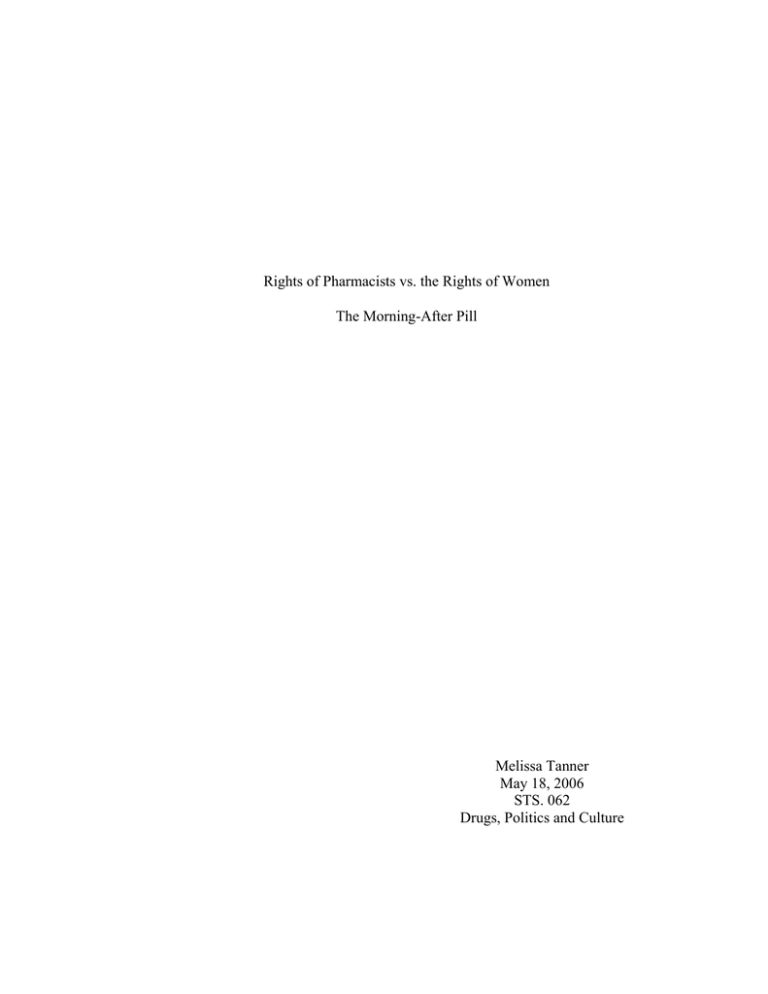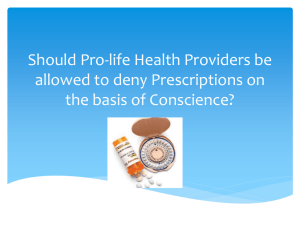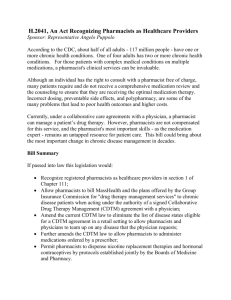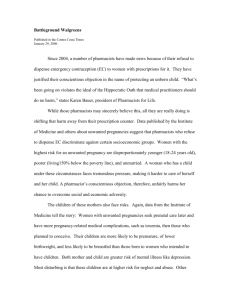Rights of Pharmacists vs. the Rights of Women The Morning-After Pill
advertisement

Rights of Pharmacists vs. the Rights of Women The Morning-After Pill Melissa Tanner May 18, 2006 STS. 062 Drugs, Politics and Culture Pharmacists, in increasing numbers, are refusing to fill prescriptions for emergency contraception, commonly known as the “morning-after pill,” citing a conscientious objection to the drug. The morning-after pill thus creates an inherent clash between the rights of women and the rights of pharmacists. All issues related to abortion are rife with conflict and are characterized by strong, unwavering opinions. The morning-after pill has become one such battleground between pro-life and pro-choice supporters. While a legal over-the-counter medication, emergency contraception is laden with moral issues. Some see the morning-after pill as equivalent to an abortion – or the murder of an unborn child; while others see it as a legitimate – and legal – solution to a problem. So is refusing to sell the morning after pill a justifiable expression of personal belief or is it merely a threat to women’s rights? While compelling arguments can be made for both sides of this issue, the integrally democratic aspect of conscientious objection, the right to exercise one’s own judgment, and the right to adhere to one’s moral beliefs outweigh the other considerations. The morning-after pill was first developed in the 1960’s as a solution for rape victims. It is now commonly used as emergency contraception for women at risk of unintended pregnancy. 1 The most common forms of the pill are Preven and Plan B. According to the Food and Drug Administration, morning-after pills are 80 percent effective in preventing pregnancy. Though there is some controversy over exactly how the pills work, the Mayo Clinic explains that the morning-after pill prevents sperm from reaching the egg, stops the ovaries from releasing eggs that can be fertilized, and keeps already fertilized eggs from attaching to the walls of the uterus (known as implantation). It must be taken with 72 hours of sexual intercourse, and is only available by prescription in most states. The morning-after pill 1 Planned Parenthood Federation of America, Inc – “A Brief History of Emergency Hormonal Contraception” 2 is different from the “abortion pills,” in that abortion pills terminate already established pregnancies, while emergency contraceptive prevents pregnancy. 2 Despite this, some still consider taking the morning-after pill to be tantamount to an abortion because they believe that life begins at fertilization, and not implantation. Others simply have moral or religious objections to the use of any form of contraceptives. It is because of these reasons that some pharmacists conscientiously object to filling prescriptions for morning-after pills. The United States has a long history of allowing for conscientious objection. Since the American Revolutionary War, exemptions have been allowed for people who had a conscientious objection to participating in a war. During World War I, conscientious objectors were permitted to serve in noncombatant military roles in deference to their beliefs; and in 1970, the Supreme Court ruled that it was not even necessary for a conscientious objector to have a religious basis for their beliefs. 3 The right to conscientiously object is an incredibly democratic freedom, and one that is inherently necessary for a culture of freedom and tolerance to exist. Similar to draftees, who by following the dictates of their consciences, objected to participating in armed conflicts, pharmacists who refuse to fill prescriptions for emergency contraceptives are merely adhering to their morals and should be accorded the same rights and privileges. News reports of pharmacists’ refusals to dispense emergency contraception date back to 1991, with accounts becoming more prevalent after 2000. “An increasing number of clashes are occurring in drugstores across the country. Pharmacists often risk dismissal or other disciplinary action to stand up for their beliefs, while shaken teenage girls and women 2 The Mayo Clinic – “Morning-after pill: How does it work?” -- http://www.mayoclinic.com/health/morningafter-pill/AN00592 3 Conscientious Objectors: A History of National Service in America, Peter Shapiro, Ed. 1994 3 desperately call their doctors, frequently late at night, after being turned away by sometimeslecturing men and women in white coats.” 4 Several states have already begun to take official action to resolve this issue. Thirteen states have passed laws legalizing “conscientious objection” and allowing health care providers to refuse to prescribe and/or dispense contraception and services related to contraception without penalty. Forty-nine states have existing “conscience clauses” written into their state legislation that allow health care providers to refuse to provide certain services on the basis of their religious beliefs. 5 On the other side of the issue, some groups have begun to push to make emergency contraception available without a prescription to eliminate the need for pharmacist interaction. The FDA recently rejected an application that would grant Plan B, one of the most common forms of emergency contraceptive, over-the-counter status in order to bypass pharmacists. 6 As of now, all emergency contraception is still only available with a prescription. The media has continued to broadcast numerous stories about the pharmacist/morningafter pill struggle. These stories, which are usually written with a deliberate and obvious slant, mainly serve to divide people along pro-choice and pro-life lines on this issue. This only serves to confuse the issue by inflaming people on each of these sides. The issue at hand is not whether abortion is right or wrong, or should be legal or illegal. Rather, the issue is whether a person has the right to use their judgment and follow their moral convictions while performing their jobs. 4 “Rape victim: ‘Morning after’ pill denied”, Carla McClain, Arizona Daily Star, Published 10.23.2005 Planned Parenthood Federation of America, Inc – “Refusal Clauses: A Threat to Reproductive Right” -http://www.plannedparenthood.org/pp2/portal/files/portal/medicalinfo/birthcontrol/fact-041217-refusalreproductive.xml 6 AMSA – “Emergency Contraception: A Brief History” -http://www.amsa.org/hp/ECD.ppt#256,1,Emergency Contraception 5 4 One of the most commonly cited reasons for why pharmacists should be required to honor valid prescriptions for emergency contraceptive is that it is “part of their jobs.” According to the American Pharmacists Association, “pharmacists are health care professionals who fill an essential role in the health care system, serving as gatekeepers to prescription medications, and more broadly, as experts on improving medication use to advance patient care.” 7 The primary job of a pharmacist, therefore, should be to provide accurate, safe, and timely dispensations of medications prescribed by doctors. The refusal to do so would thus be a failure to perform the most basic responsibilities of their jobs. This argument, however, shows only a superficial understanding of the issue. Pharmacists, as health care professionals, have to abide by the Hippocratic Oath. The original Hippocratic Oath even forbade abortion: “I will neither give a deadly drug to anybody who asked for it, nor will I make a suggestion to this effect. Similarly I will not give to a woman an abortive remedy.” 8 While the modern version no longer contains this clause, it still forbids the doing of harm. Therefore a pharmacist who honestly believes that emergency contraception is the destruction of a human life is actually “doing his or her job” by refusing to fill the prescription. The other aspect of the pharmacists should merely follow orders and do their jobs argument is that the prescriptions are written by doctors, who by the nature of the profession, are more informed about their patient and his or her interests. If the physician decides that a medicine is needed, the pharmacist should simply dispense that medication and not impose 7 American Pharmacists Association: Improving Medication Use. Advancing Patient Care. -http://www.aphanet.org//AM/Template.cfm?Section=Home 8 PBS – “Hippocratic Oath – Classical Version” -- http://www.pbs.org/wgbh/nova/doctors/oath_classical.html 5 his or her own judgment on the matter. In this scenario, the pharmacist is no more than a lackey whose sole function is to mindlessly perform the doctor’s orders. In reality, pharmacists are well-educated professionals who are actually responsible for instructing patients on the appropriate use of medications and for ensuring the safety of drugs prescribed in combination. 9 Their duty is to safeguard the health of their clients. Some pharmacists view a pregnant customer as two clients – and want to ensure the safety of each. Thus, as pharmacists are knowledgeable professionals with a commitment to their patients, “it seems inappropriate and condescending to question a pharmacist’s right to exercise personal judgment in refusing to fill certain prescriptions.” 10 In addition, pharmacists have a clear responsibility to follow their judgment and abide by what they believe is right. Following orders is not a valid excuse for abandoning what one believes is right. For pharmacists who refuse to fill prescriptions for morning-after pills, abortion is viewed as murder – a clear and obvious crime. The Nuremberg Defense 11 - if someone is only following orders, they are not responsible for his or her crimes - has not been considered a valid defense against charges of crimes. In fact, the United States military has included a rule explicitly stating that American military personnel are allowed to refuse unlawful orders. Similarly, pharmacists should be allowed to refuse to fill prescriptions that they believe are tantamount to aiding and abetting in criminal activities regardless of whether they are facing orders to the contrary. 9 American Pharmacists Association: Improving Medication Use. Advancing Patient Care. -http://www.aphanet.org//AM/Template.cfm?Section=Home 10 Julie Cantor and Ken Baum – “The Limits of Conscientious Objection – May Pharmacists Refuse to Fill Prescriptions for Emergency Contraception?” – The New England Journal of Medicine 11 “Famous World Trials: Nuremberg Trials 1945-1949”, Douglas Linder 6 The argument generally used to counteract this contention is that, if a pharmacist is not willing to provide these legal drugs, then maybe they should find new jobs. This does not seem to be a feasible solution to the problem. According to the American Pharmacist Association, “physicians and nurses are not required to participate in activities they find objectionable, and limiting entrance into [the pharmacological] profession to those with a specific belief system is hardly an appropriate answer. Pharmacists are individuals, and no pharmacist should be forced to participate in an activity he or she finds objectionable, particularly when other alternatives exist.” 12 Julie Cantor and Ken Baum also note in their paper on this debate that professionals should not have to forsake their morals as a condition of employment, citing the examples of lawyers who can choose the clients and issues they represent and physicians who can choose their patients. 13 Forty-nine states have clauses written into their state legislation that allow health-care providers to opt out of certain procedures, such as abortions. Pharmacists, as health care providers, should be afforded that same consideration when it comes to the morning-after pill. Their aversion to providing a drug that they see as causing an abortion should not force them out of their chosen profession. Along the same lines as the argument that pharmacists should simply do their jobs is the argument that, because FDA rulings have kept emergency contraceptive available only through prescription, pharmacists are needed to supply it. The morning-after pill is a legal, physician prescribed drug, and the pharmacist is an essential link in order for the patient to receive the drug. To ensure that patients receive their prescribed medication, it is therefore necessary for pharmacists to do their jobs. If pharmacists are allowed to decline to fill these 12 Susan C. Winckler and John A. Gans – “Conscientious Objection and Collaborative Practice: Conflicting or Complementary Initiatives?” -- American Pharmacists Association 2006 13 Julie Cantor and Ken Baum – “The Limits of Conscientious Objection – May Pharmacists Refuse to Fill Prescriptions for Emergency Contraception?” – The New England Journal of Medicine 7 prescriptions, access to a legal medicine is severely limited. The news is filled with accounts of rape victims and other women spending “frantic days trying to obtain the drug to prevent a pregnancy, know that each passing day lower[s] the chance the drug w[ill] work.” 14 In some rural or poorer areas where there are few pharmacies, allowing pharmacists to refuse to provide the pill would severely limit the women in these areas from being able to obtain it. Studies by the Mayo Clinic have shown that emergency contraceptive needs to be taken as soon as possible within three days of unprotected sex. 15 Clearly, in order for the drug to be effective, it is important that it is easily accessible and readily available. Difficulty in obtaining a legal, doctor-prescribed medication, especially one where time is of the essence, does seem to be a good argument for forcing pharmacists to fill the prescriptions. The argument, however, fails to take into account that if it did become illegal for pharmacists to refuse to fill those prescriptions, some pharmacies might simply decide not to stock the product at all in an attempt to avoid the problem and the controversy. In fact, the Arizona Family Planning Council survey found that “only 43 percent of Arizona pharmacies keep [emergency contraceptives] in stock, while most that do not - nearly 60 percent - cited lack of demand as the reason. Another 10 percent cited moral reasons.” 16 Another study done by the Planned Parenthood Federation of America found that, contrary to the claims of the other studies, demand for emergency contraceptive is in fact increasing. 17 This seems to indicate that the controversy surrounding forcing pharmacists to fill emergency contraceptives, and the lawsuits and negative publicity that can result, is already discouraging 14 “Rape victim: ‘Morning after’ pill denied”, Carla McClain, Arizona Daily Star, Published 10.23.2005 Mayo Clinic – “Emergency Birth Control” -- http://www.mayoclinic.com/health/birthcontrol/BI99999/PAGE=BI00040 16 “Rape victim: ‘Morning after’ pill denied”, Carla McClain, Arizona Daily Star, Published 10.23.2005 17 Planned Parenthood Federation of America, Inc – “Refusal Clauses: A Threat to Reproductive Right” -http://www.plannedparenthood.org/pp2/portal/files/portal/medicalinfo/birthcontrol/fact-041217-refusalreproductive.xml 15 8 pharmacies from stocking these drugs – making the drugs actually more difficult to find. Clearly, not allowing pharmacists to “conscientiously object” is not the solution for making the drug more accessible. The other argument commonly used when attempting to make a case for forcing all pharmacists, regardless of their moral convictions, to provide the morning-after pill is that the morning-after pill is not an abortion – and actually serves to prevent abortions. A ready supply of the drug would, therefore, decrease the number of abortions performed. According to statistics provided by the Planned Parenthood Federation of America, emergency contraception “could prevent 1.5 million unintended pregnancies and 800,000 abortions each year in the U.S.” 18 Thus, both pro-choice and pro-life groups should embrace this drug. While this argument makes sense if life is considered to start at implantation, it makes no sense at all if life is believed to start at fertilization. Many people vary on their belief on when life actually starts and on what constitutes a human life. The religious beliefs of many, and for others – just common sense, dictate that life begins at fertilization – a belief also held by the founder of embryology 19 . According to a study by Kischer, “virtually every human embryologist and every major textbook of Human Embryology states that fertilization marks the beginning of life of the new individual human being.” 20 So even though implantation is the current medical and legal definition for pregnancy, to the many people who believe that life begins at fertilization, emergency contraception, which has the possibility of preventing implantation of an already fertilized egg, is an abortion. The argument that emergency 18 Planned Parenthood Federation of America, Inc – “A Brief History of Emergency Hormonal Contraception” “When Does Human Life Begin? The Final Answer” – C. Ward Kischer -http://www.lifeissues.net/writers/kisc/kisc_04whenlifebegins1.html 20 “The Code for Human Life” – Frederick T. Zugibe, M.S., M.D., Ph.D., FCAP, FACC, FAAFS -http://www.e-forensicmedicine.net/code.htm 19 9 contraceptive prevents abortions, therefore, does not work. The issue here is not when life begins, it is what the pharmacist believes; and if the pharmacist believes that life begins at fertilization, then for them to provide the morning-after pill is for them to enable an abortion – which they may view as a murder. The debate over the morning-after pill is closely aligned with the ongoing debates over abortion. Women’s rights are constantly touted as being violated by the pharmacists’ refusal to provide emergency contraceptive. Some women believe that they should have complete control over their bodies, and see the pharmacists’ refusal as a violation of their rights as women. The struggle over the morning-after pill does result in a struggle between the rights of women and the rights of pharmacists. The debate over pharmacists refusing to fill prescriptions for emergency contraceptives, however, should not become a debate over whether or not abortion is murder or even whether or not abortion should be legal. Abortion is a controversial issue that will probably never be completely resolved. Whether abortion is the murder of an unborn child or not, these pharmacists believe that it is, and they have a strong moral aversion to providing the emergency contraception that would enable the abortion. Therefore, the issue should instead be whether a person has the right to conscientiously object to selling a product. The United States prides itself on being a land of freedoms and choices. In order for this culture of choice and tolerance to exist, people’s opinions and ideals must be respected. The ability to object based on one’s conscience is a long standing democratic principle and one of the hallmarks of this country. In fact, with the emphasis that the pro-choice movement places on choice, “denying choice for pharmacists in matters of reproductive rights and 10 abortion seems ironic.” 21 In this country where freedom and choice are so treasured, the right of pharmacists to make decisions based on their moral convictions should not be taken away. Probably the most compelling argument in favor of forcing pharmacists to honor morning-after pill prescriptions is that it could lead to an abuse of power. “Pharmacists are privy to personal information through prescriptions. A customer who fills prescriptions for zidovudine, didanosine, and indinavir is logically assumed to be infected with HIV. If pharmacists can reject prescriptions that conflict with their morals, someone who believes that HIV-positive people must have engaged in immoral behavior could refuse to fill those prescriptions…Such objections go beyond ‘conscientious’ to become invasive.” 22 This argument does pose a legitimate concern and worry. Allowing a pharmacist to deny medication on the basis of their morals could quite possibly be a slippery slope that would enable them to deny other medications to other patients. While this is a real concern, the arguments in favor of allowing pharmacists to refuse to fill emergency contraceptive prescriptions still seem to outweigh it. Forcing pharmacists to sell the drug will not solve the problem, and could simply lead to further shortages. From a simple supply and demand point of view, for as long as emergency contraceptive, and any other drug, is legal, there will be pharmacies willing and able to stock and sell it – so individual pharmacists should not be required, against their will, to provide them. Pharmacists, like other health-care professionals, must be accorded certain rights. While patients are also entitled to certain things, these should not be at the expense of the pharmacists’ morals and freedoms. 21 Julie Cantor and Ken Baum – “The Limits of Conscientious Objection – May Pharmacists Refuse to Fill Prescriptions for Emergency Contraception?” – The New England Journal of Medicine 22 Julie Cantor and Ken Baum – “The Limits of Conscientious Objection – May Pharmacists Refuse to Fill Prescriptions for Emergency Contraception?” – The New England Journal of Medicine 11 A woman’s right to have access to emergency contraception has to be weighed against the right of a pharmacist to stick to their moral convictions. Pharmacists should be accorded the same rights as other professionals when it comes to having the freedom to use their personal judgment when making decisions. The United States, with its long history of allowing for conscientious objection and its support of religious freedoms, should respect the moral beliefs of pharmacists and allow them to opt out of situations that they are morally opposed to without fear of repercussions. In addition, forcing all pharmacists to provide emergency contraceptive would probably limit access to the drug since some pharmacies would simply choose to stop carrying the products rather than face the lawsuits and controversies that would result. Without passing a moral judgment on abortion or the use of the morning-after pill, the democratic nature of being able to conscientiously object, the right of professionals to exercise their own judgment, the right to adhere to one’s moral beliefs, and the negative consequences that would result if pharmacists were forced to provide all prescribed medications outweigh the other concerns; and therefore, pharmacists should have the right to refuse to fill prescriptions for the morning-after pill. 12




